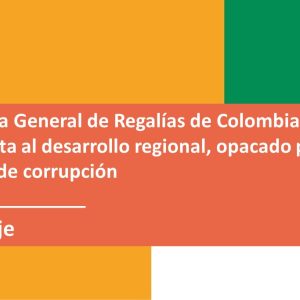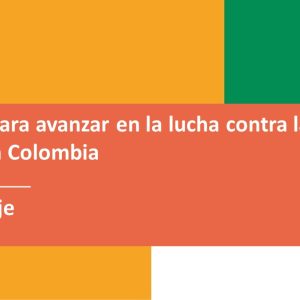The outlook is bleak in La Jagua de Ibirico, since a month ago the crisis that began a year ago with the pandemic was confirmed. Prodeco, the Swiss subsidiary of the Swiss coal company Glencore in Colombia, announced that it would return its mining titles it held in this area of Cesar in the face of the National Mining Agency (ANM).
The company explained that its exit was due to the fact that it was not financially able to develop the operation, due to the low price of the mineral in the world.
“The decision to relinquish the mining contracts has not been taken lightly and is a disappointing outcome. During the last 30 years of mining activity in the country, the group has invested more than 3 billion dollars and paid around the same amount in royalties and taxes,” the company explained in a statement.
“We had the hotel thirty years ago,” Marcos laments. We rented rooms to Prodeco workers. The business generated an average monthly income of 6 million pesos, now we barely have one guest who represents 300,000 pesos. We are on the verge of closing”.
The cessation of mining activity is significantly evident in La Jagua de Ibiríco, since 80 percent of its economic dynamics derives directly and indirectly from coal mining.
“In the end, there will be no one left in the company. There will be 5,000 jobs lost, both direct and indirect, in the two mines of La Jagua and Calenturitas,” said Alfredo Coronado, mining advisor to the Cesar Government.
Coronado adds that the impact is high, since the average salary was 3 million pesos, so “we would be talking about 15 billion pesos a month, which would be 180 billion pesos a year, the money that circulated in the area”.
The municipality’s income will also be affected. “We will stop receiving around 20,000 million pesos in royalties, as well as the amount of resources that stop circulating because most of them depend on these resources,” stressed Ovelio Jiménez, mayor of La Jagua.
Now the people are different. Commercial establishments significantly decreased their income, some could not withstand the onslaught and were forced to close, while others are operating at half capacity. Laundry and food service workers have left these trades and the informal sector has increased in the area, such as motorcycle taxis and street vending.
Jaime Luis Ochoaone of the businessmen in the mining area, affirms that the closing of Prodeco affected his field of action due to the non-payment of bank loans to which he had access for the consolidation of his business processes, the purchase of machinery and supplies with which he had been providing services to the company.
“The mining company left us adrift. It provided operational, heavy equipment and industrial safety training services. We created it in 2008 and since 2017 it was providing services to that company and we had to close it on March 24 last year. I have my business and personal accounts seized and today we are bankrupt. The National Guarantee Fund is charging us for the support it offered for these loans. The National Government has not said anything so far,” Ochoa stressed.
Consequences throughout Cesar
Coal mining is one of the most important activities in Cesar, impacting not only La Jagua de Ibirico but also the commercial dynamics of the other municipalities in the so-called mining corridor: Agustín Codazzi, Becerril, El Paso and Chiriguaná.
A total of 46 million tons are mined annually in the region, from which nearly 225,000 million pesos are earned in direct royalties.
And with the exit of Prodeco, Cesar would no longer receive about 30 percent of the annual royalties generated by the mining activity, which is fluctuating between 40,000 and 60,000 million pesos.
“The company contributed to the department’s grand total of between 15 and 18 million tons that it has been producing lately,” said Manuel Mejia Pallares, secretary of mines of Cesar.
A shock for the inhabitants of the mining corridor, political leaders and unions of the department that, apparently, did not take them by surprise, since the company had been making layoffs since 2020.
“Since the pandemic, all operations in these areas have been suspended,” said Jesús Chacón, a member of the workers’ union.
“The company had about 2,600 workers, of which 300 were dismissed and 1,200 took advantage of the voluntary retirement plans that the company has been offering. At the moment it has 950 workers,” explained Robertson Salazar, general secretary of Sintramienergética in La Jagua.
In view of this situation, the National Mining Agency (ANM) has until tomorrow to make a decision regarding the relinquishment of the titles by the Prodeco Group, assessing the environmental, economic and social obligations of the company in the territory.
“That is to say, all these obligations contracted by the company must be reviewed, according to the contract license, sanitizing the mining responsibility, the compensation with the department and the municipalities,” said Mejia Pallares.
The company will lose 5,000 jobs in the region and some 180 billion pesos per year will cease to circulate in the area.
Has the coal industry come to an end?
Experts have mixed views on the future of the coal industry in Colombia.
Falling prices, the pandemic and decarbonization in 2020 exacerbated the crisis in this sector.
Adding to Prodeco’ s news was that last year El Cerrejón closed its exports with 13.6 million tons (the lowest in the last 18 years, representing a 50 percent drop with respect to 2019 exports). Drummond did not perform so badly, with a 10.3 percent decrease in extraction and a 4.4 percent decrease in foreign sales.
Despite this, Juan Camilo Nariño, president of the Colombian Mining Association (ACM), maintains that the industry has not come to an end in our country.
“Colombia has a great opportunity to reach new markets. The demand for the mineral has changed its destination and will continue to do so, concentrating on Asia,” says Nariño, who adds that the country has 70 years of reserves that are still pending to be extracted and continue generating employment, taxes and royalties.
However, Julio César Verapresident of the XUA Energy FoundationThe coal industry is in its final quarter of an hour, he says, which, he says, should give the National Government and to those engaged in this field an incentive to give back to the coal regions what has historically been denied to them.
“There is a trend in the world to move to much cleaner energies, so coal is not in those plans. It is necessary that this historical misappropriation of royalty resources be returned with social projects and real investments for these areas that live on these resources, because when they leave they will be left adrift,” Vera said.
Regarding the coal outlook in the country, Vera argues that as the United States advances in its implementation of exploiting unconventional deposits, Colombia will be able to advance in the use of coal in a responsible manner to take advantage of the final stretch of this material.


